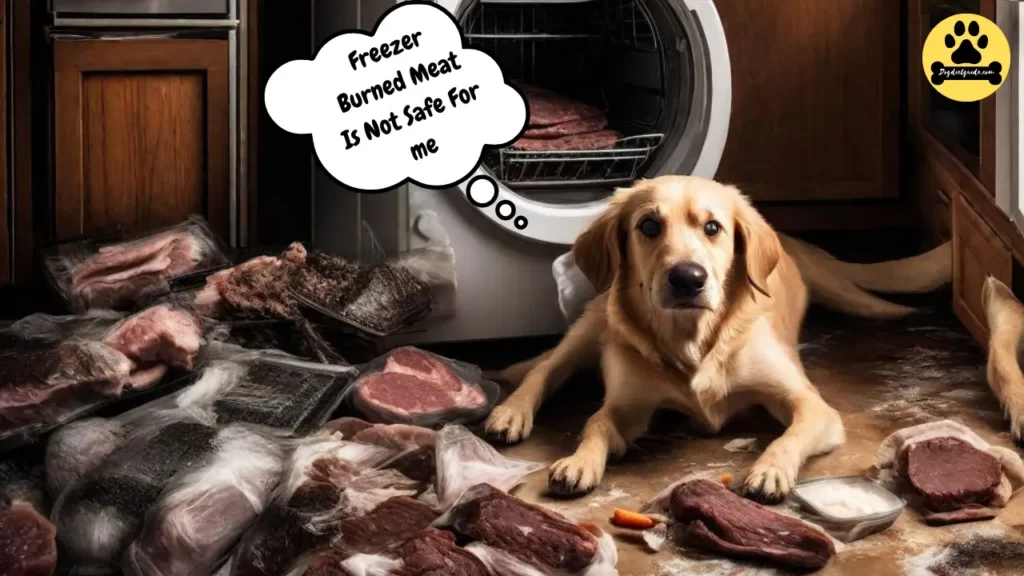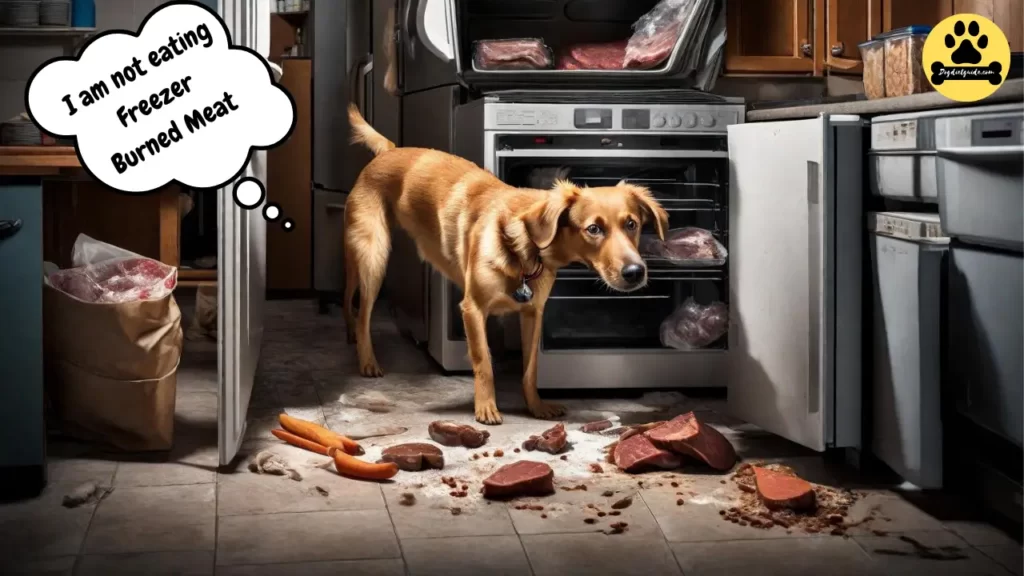
In the ever-evolving world of pet care, dog owners often navigate myriad questions regarding their furry companions’ diets. One common query that arises is whether it’s safe for dogs to consume freezer-burned meat. As conscientious pet parents, we strive to provide our four-legged friends nutritious and wholesome meals.
However, when faced with the dilemma of freezer-burned meat, uncertainties arise about its impact on our canine companions’ health. So, can dogs eat freezer burned meat?
Overview
Freezer-burned meat is not inherently toxic to dogs. However, there are potential health risks. The altered texture and taste may deter some dogs from consuming it, but there’s a risk of gastrointestinal upset for those undeterred.
Decoding Freezer Burn
Before addressing suitability of freezer burn meat for dogs, let’s demystify what freezer burn entails.
Freezer burn occurs when food is exposed to air within the freezer, leading to dehydration and the formation of ice crystals on the surface of the meat.
Can Dogs Eat Freezer Burned Meat?
No, avoid giving freezer-burned meat to your dog. The more significant concern with freezer-burned heart is the potential for developing harmful bacteria or other contaminants.
Freezer burn beef does not make the heart unsafe to eat, but if it has been in the freezer for an extended period and is improperly stored, there is a risk of bacterial growth that could harm your pup.
The dehydration process can result in the loss of essential nutrients. Considering the impact on your dog’s overall health is crucial before incorporating any food into their diet.

Health Risks
- Nutrient Loss: Freezer burn can lead to moisture loss in the meat, which may change its texture and flavor. Additionally, some essential nutrients may be affected, potentially impacting the nutritional value of the meat.
- Flavor and Palatability: Canines may be less inclined to eat freezer-burned meat due to changes in taste and texture. If your dog refuses to eat the meat, it could affect their overall nutrition.
- Bacterial Contamination: If the freezer-burned meat has been improperly stored for an extended period or shows signs of spoilage (such as off odors, discoloration, or sliminess), there is a risk of bacterial contamination. Harmful bacteria can pose health risks to dogs if consumed.
- Digestive Upset: Consuming spoiled or contaminated meat can lead to digestive upset in dogs, including vomiting and diarrhea.
- Potential Toxins: If the freezer-burned meat was contaminated with toxins from bacterial growth or other sources, it could harm your dog’s health.
Related Post: Can Dogs Eat Crab Rangoon?
Safety Precautions
If you decide to feed your dog freezer-burned meat, take precautions. Trim away the affected areas, removing any discolored or tricky sections.
Option for lean cuts to mitigate the impact of potential nutrient loss. Always cook the meat thoroughly to eliminate any bacteria that might have developed during freezing.
Alternative Dog-Friendly Options
To ensure your furry friend receives optimal nutrition, consider alternative options. Fresh, high-quality dog food and treats formulated explicitly for canine consumption are readily available.
These alternatives guarantee a balanced diet, reducing the risk of potential health issues associated with freezer-burned meat.

Before introducing any new food into your dog’s diet, it’s advisable to consult with your veterinarian. They can provide personalized guidance based on your dog’s breed, age, and health status, ensuring that any dietary adjustments align with your pet’s unique needs.
Observing Behavioral Changes
Every dog is different, and individual reactions to freezer-burned meat may vary. Monitor your dog’s behavior closely after consumption.
If you notice any adverse reactions, such as lethargy, vomiting, or diarrhea, cease feeding freezer-burned meat and consult your veterinarian promptly.
Educating Pet Owners
As responsible pet owners, we must stay informed about the foods we offer our four leged friends. Sharing knowledge within the pet owner community fosters a culture of responsible pet care.
Educate fellow pet owners about the potential risks associated with freezer-burned meat, promoting the overall well-being of our furry friends.
Related Post: Can Dogs Eat Goat Colostrum?
FAQs
Can meat go bad in the freezer?
Yes, meat can go bad in the freezer. While freezing can significantly slow down the growth of bacteria, it doesn’t completely halt it. Over time, freezer burn, temperature fluctuations, and other factors can affect the quality of frozen meat. It’s essential to adhere to recommended storage times for different types of meat to ensure its safety and taste.
Can you cook freezer burnt meat for dogs?
Cooking freezer-burnt meat for dogs is generally not recommended. Freezer burn occurs when ice crystals form on the meat’s surface due to inadequate packaging or prolonged storage. While it’s not harmful to dogs, freezer-burnt meat may have a compromised texture and flavor. It’s better to prioritize the freshness and quality of the food you feed your pets to ensure they receive the necessary nutrients.
How old is too old for frozen meat?
The age limit for frozen meat depends on how well it has been stored. Generally, frozen meat remains safe indefinitely if kept at a consistent 0°F (-18°C) or below. However, the quality and flavor may decline over time. For optimal taste and texture, consuming frozen meat within 2 to 3 months is advisable. Proper packaging, airtight containers, and efficient temperature control play vital roles in preserving the quality of frozen meat.
Final Thoughts: Can Dogs Eat Freezer Burned Meat?
In conclusion, while dogs can technically eat freezer-burned meat, it’s essential to approach this with caution. Prioritize your dog’s health by considering the potential loss of nutritional value and the associated risks.
Opting for fresh, high-quality dog food ensures your furry friend receives the nutrition they deserve, promoting a happy and healthy life. Always consult your veterinarian for personalized advice on your dog’s dietary needs.
” It is essential to emphasize that while we offer valuable insights, we do not intend to replace or undermine the importance of your veterinarian’s advice. The information presented on our site is purely for informational and educational purposes.”

I’m JK. A pet lover who has years of pet blogging experience. I thought it would be a great idea to share my experience with all dog owners so they can also keep their canine companions healthy and happy.






